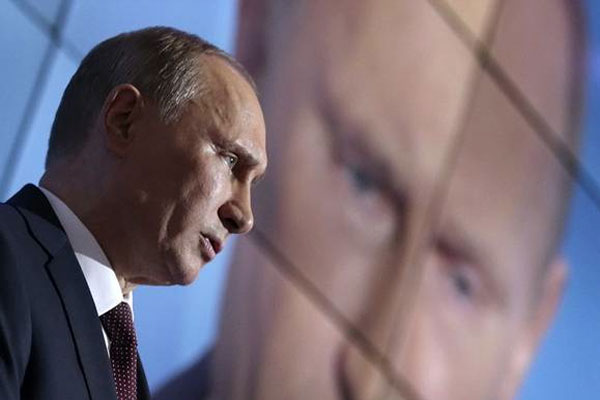What Putin Chooses Not to Know About Russian History

KGB agents are apparently not taught history, or so it would seem from Vladimir Putin’s recent statement that only “God knows” how a part of southeastern Ukraine ever became part of that country. The Russian president refers to the region as “New Russia,” an old idea that has always been — and remains — an aspiration rather than a fact. Luhansk, Donetsk, Odessa and other New Russian cities have been a part of Ukraine for nearly a century. And even before that, they were never truly Russian.
It was Empress Catherine II who first articulated the ambition that this territory, which she acquired from the Ottoman Turks in the latter half of the 18th century, would become “Novorossiia.” Catherine wanted her subjects to settle the new, mostly vacant land, and she did her best to lure Russian nobles into the area. But few were willing to take chances on “the wild fields,” no matter what kind of deals she offered.
Next, she posted fliers in Europe promising cheap land, religious freedom and exemption from taxes and military service to those who would settle in the area. Mennonite and Catholic Germans, Italians, Jews, and some Swiss, among other nationalities, accepted the invitation.
Later, Catherine’s grandson, Czar Alexander I, recruited dissidents from the Ottoman Empire — Albanians, Serbs, Bulgarians, Moldavians, Greeks, Armenians and even some Turks — to settle in New Russia as an anchor against any Ottoman attempts to reclaim it. Some of the pockets of foreign settlement were even exempted from Russian czarist rule and allowed to preserve their national languages and customs. In the end, Catherine’s New Russia became home to many more non-Russians than Russians.
The area’s major cities also had distinctly non-Russian roots. Luhansk was founded in the late 1700s by an Englishman, and Donetsk was established in 1865 by a Welsh entrepreneur, who built a steel mill and opened coal mines. For almost a century after its founding, the settlement was known as Yuzkovo (as close to the name of its founder, John Hughes, as the residents could manage) before being changed to Donetsk in 1961.
Early European governors of Odessa, New Russia’s largest Black Sea port, helped by the czars, did much to develop its economy and welfare. But by the mid-19th century, Russia was suspicious of the city because of its foreign population. Greeks, Bulgarians, Poles and Ukrainians formed secret societies. Jews made up an increasing percentage of the population. And Nicholas I, who ruled from 1825 to 1855, called Odessa “a nest of conspirators.”
Fearing the perceived lawlessness and tumult of this cosmopolitan city, Russian czars began to appoint military governors to oversee the area, and they quit paying for infrastructure there, turning instead to other Black Sea ports. Had Odessa been more Russian, it might have fared better.
Even in Soviet times, Odessa was a city low on the pecking order. Again, as in czarist days, its residents weren’t given to taking edicts from the Russian government all that seriously. One never could be quite sure of Odessa’s Marxist orthodoxy — after all, this was where Leon Trotsky had gone to school and where Mensheviks flourished before 1917. After the 1917 revolution, it took several years for the Bolsheviks to subdue the city.
The Soviet regime increased Russian presence in the region, but Odessa never fully embraced Moscow, and it remained a poor cousin to other Soviet cities. Food and goods were in shorter supply than elsewhere, and first-rate opera and ballet companies rarely played the gorgeous Opera House designed by Austrians in the 1880s.
It’s easy to understand why Putin would covet and wish to annex Odessa and other southeast Ukrainian cities, but calling them Russian cities evokes a history that never was. In the 1920s, when Vladimir Lenin made the region officially a part of Ukraine and granted the Ukrainian Socialist Republic a veneer of autonomy, he said he was doing so “to avoid Great Russian imperialism and chauvinism.” Vladimir Putin clearly sees nothing wrong with these traits.